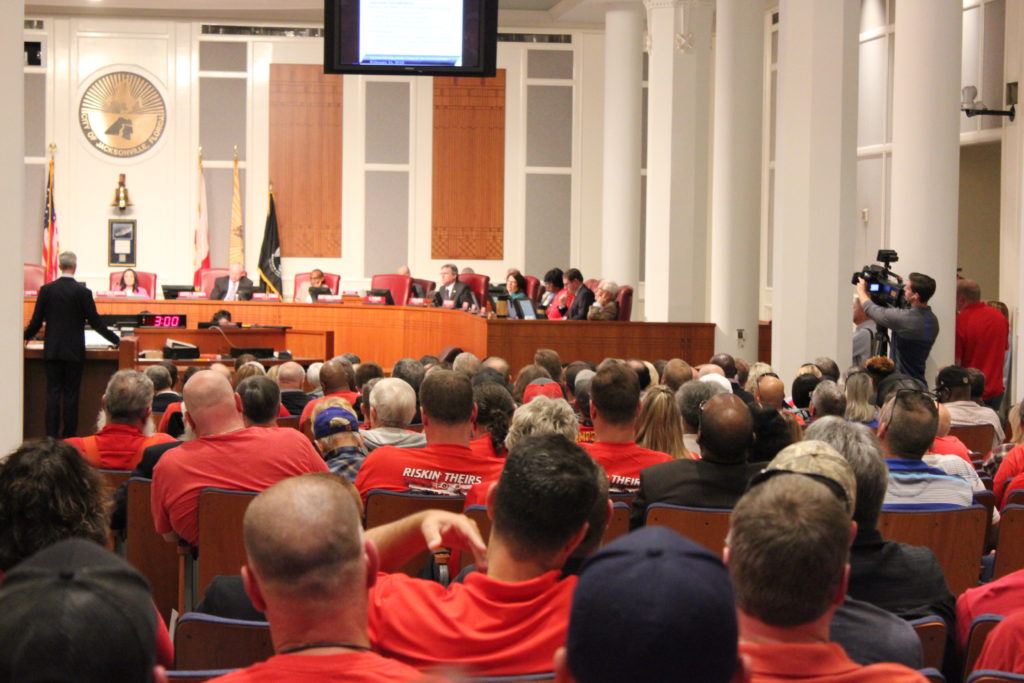JEA could be worth $3 to $6 billion if put on the market for sale, according to an outside adviser’s report presented to City Council Wednesday night.
But several councilmen questioned the purpose of selling the electric, water and sewer company, which is owned by the community and pays the city around $100 million a year in fees.
“I don’t get it,” said Councilman Tommy Hazouri after the presentation. “What’s broken?”
Councilman Danny Becton grilled JEA CEO Paul McElroy and Board Chair Alan Howard, asking why JEA would spend almost $100 thousand on a valuation report when it claims it’s just considering whether a sale makes sense. Becton compared it to ordering an appraisal on your home when you have no plan to sell it. Howard responded that he goes on Zillow regularly to check the value of his home.
“Well I do, too,” said Becton. “But Zillow is free. It doesn’t cost me $100 thousand.”

The sale was first proposed publicly in November 2017, by retiring JEA board member Tom Petway, a political donor of Mayor Lenny Curry. The company was then ordered to seek an outside valuation and hired Public Financial Management, who says it specializes in utilities. It said a combination of positive market forces plus the good reputation JEA has in the industry make the timing right for potential sale.
But Council President Anna Brosche questioned the firm’s credentials. “Valuation services are not even listed on your website,” she said. “Are you a valuation expert?”
“No,” said Managing Director Michael Mace. He said his credentials were his years of experience.
“There are valuation credentials that people in the business hold. What are they?” Brosche asked.
“I don’t know,” he replied, to murmmers from the crowd.
Brosche originally declined to call a special council meeting to review the report, as requested by Mayor Lenny Curry. So two days ago, Curry called the meeting. He said via Tweet, “I called this meeting so all could get this document at the same time,” and said he was after transparency.
But there was confusion among council members as to the purpose of the meeting and whether or not either the JEA board or City Council would be requested to take action.
Some questioned the timing of the meeting – 3:00 p.m. on Ash Wednesday, which also happened to be Valentine’s Day.
“I’m sure this is where you all want to be going into Valentine’s Day evening,” joked Brosche to the standing-room only crowd as she began the meeting, and said she’d try to bring the meeting to a close by 5:50 p.m. She laid out, and enforced, strict rules for behavior from the public. No holding up signs and no commenting on the meeting. Many in the crowd were JEA employees who wore red shirts to identify themselves. The crowd obeyed Brosche’s orders for the most part, although there were occasionally spontaneous outbursts.
One occurred when Mayor Curry approached the podium to offer remarks, but Brosche declined to recognize him. He returned to his seat to quickly-shushed jeers and whistles, leaving after the presentation but before Council members asked questions and public comment.
The other notable rumble from the crowd came during the presentation when Mace said a provision could be added into a sales contract that employees would keep their jobs. The crowd sounded skeptical.
Public comment ran against the sale. Hazouri noted they’ve received more interest from the public on this issue than on the Human Rights Ordinance issue.
Former Jacksonville Planning Commission board member, Lisa King, questioned whether the sale has been quietly in the works longer than has been claimed. Curry replaced board members, including King, at various city agencies including JEA when he took office. Board members are supposed to be independent, with staggered resignation dates, so critics accused the mayor of packing the boards with political supporters.
Brosche and other council members said they still had unanswered questions and plan to meet further on the issue.


Leave a Reply